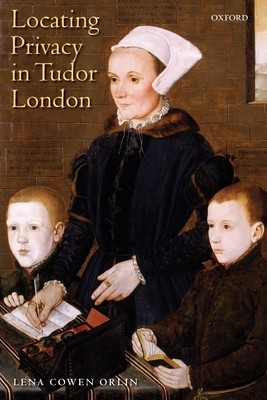
- We will send in 10–14 business days.
- Author: Lena Cowen Orlin
- Publisher: Oxford University Press, USA
- ISBN-10: 0199577382
- ISBN-13: 9780199577385
- Format: 15.6 x 23.4 x 2 cm, softcover
- Language: English
- SAVE -10% with code: EXTRA
Reviews
Description
Locating Privacy in Tudor London asks new questions about where private life was lived in the early modern period, about where evidence of it has been preserved, and about how progressive and coherent its history can be said to have been. The Renaissance and the Reformation are generally taken to have produced significant advances in individuality, subjectivity, and interiority, especially among the elite, but this study of middling-sort culture shows privacy to have been an object of suspicion, of competing priorities, and of compulsory betrayals. The institutional archives of civic governance, livery companies, parish churches, and ecclesiastical courts reveal the degree to which society organized itself around principles of preventing privacy, as a condition of order. Also represented in the discussion are such material artifacts as domestic buildings and household furnishings, which were routinely experienced as collective and monitory agents rather than spheres ofexclusivity and self-expression. In 'everyday' life, it is argued, economic motivations were of more urgent concern than the political paradigms that have usually informed our understanding of the Renaissance. Locating Privacy pursues the case study of Alice Barnham (1523-1604), a previously unknown merchant-class woman, subject of one of the earliest family group paintings from England. Her story is touched by many of the changes-in social structure, religion, the built environment, the spread of literacy, and the history of privacy-that define the sixteenth century.
EXTRA 10 % discount with code: EXTRA
The promotion ends in 19d.15:05:10
The discount code is valid when purchasing from 10 €. Discounts do not stack.
- Author: Lena Cowen Orlin
- Publisher: Oxford University Press, USA
- ISBN-10: 0199577382
- ISBN-13: 9780199577385
- Format: 15.6 x 23.4 x 2 cm, softcover
- Language: English English
exclusivity and self-expression. In 'everyday' life, it is argued, economic motivations were of more urgent concern than the political paradigms that have usually informed our understanding of the Renaissance. Locating Privacy pursues the case study of Alice Barnham (1523-1604), a previously unknown merchant-class woman, subject of one of the earliest family group paintings from England. Her story is touched by many of the changes-in social structure, religion, the built environment, the spread of literacy, and the history of privacy-that define the sixteenth century.


Reviews